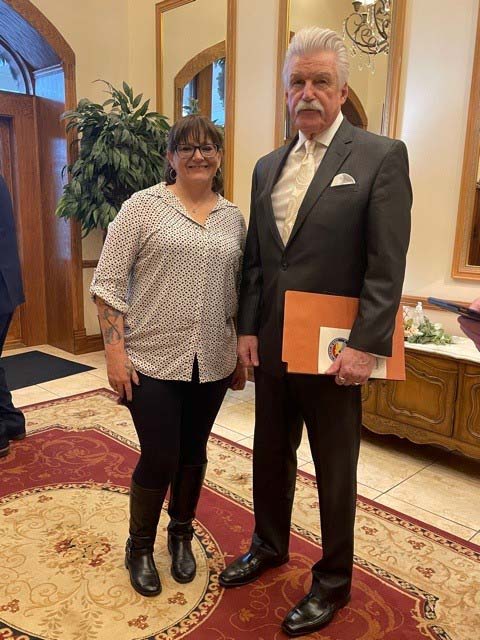Glasgow Announces 27 Participants Graduate Will County Problem Solving Court Alumna Tells Audience That Before Entering Program, “I Was Absolutely Certain That My Addiction Was The End For Me”
January 20, 2023 JOLIET – State’s Attorney James Glasgow has announced that 27 people graduated from the Will County Problem Solving Courts in a January 19 ceremony at the Jacob Henry Mansion in Joliet. To date, 796 individuals have turned their lives around through the diversionary court program.
“The twenty-seven individuals graduating today are to be commended for successfully embarking on their roads to recovery. In reading the biographies of these dedicated graduates, it struck me how they all talked about their plans for their futures. Through this program, they have a renewed hope,” Glasgow said. “Although they are now alumni, we will continue to support them as they continue in their lifetime journeys. They are members of the Problem Solving Courts family.”
The ceremony honored five Veterans Court graduates, from Joliet, Aurora, Beecher, Wilmington, and Plainfield; 11 Drug Court graduates hailing from Joliet, Marseilles, Crete, Bolingbrook, and New Lenox; and 11 Mental Health Court graduates, who hail from Lockport, Romeoville, Joliet, Shorewood, Plainfield, Braidwood, and Homer Glen.
In addition to remarks by Glasgow and Associate Circuit Court Judge Fred Harvey, Problem Solving Courts alumna Danita Morgan of Braidwood spoke about her experience. Morgan graduated from Mental Health Court in January 2022. Here is an excerpt of her speech:
There once was a point in my life that I was absolutely certain that my addiction was the end for me. I felt worthless. I messed up too much to be forgiven. There was no going back. It was my life and would be my death. After suffering the greatest pain any human being could feel with the death of my son, I wanted it to end me. I tried to end me. I failed. When I was lost, I didn’t think I could be found and I didn’t want to be.
Then I was introduced to the problem solving court. ….
Once someone takes the first steps to reconnect themselves to who they truly are and get clear, it’s scary. To feel emotions again. To not know what they are anymore. To doubt every thought and action. To go ahead on into uncomfortability and the absolute unknown. To face the horrible things we have done to those who love us so much. To relearn the coping skills needed for a healthy and happy life. The program assists in that process. However, the support doesn’t stop after graduation. . . . .
Some of you are probably planning your relapse at this very moment. To those who are, I beg of you to reconsider. Fully trust that the support you have received from this program will continue after this graduation. You are absolutely worth more than becoming another statistic.
Morgan has worked with the Will County Substance Use Initiatives Team in the Will County Health Department since graduating from the program. She is also working to complete her internship with the Braidwood Health Area Community Coalition to become a Certified Recovery Support Specialist.
Glasgow began Will County’s Problem-Solving Court program in 1998, writing the grant that led to the establishment of the Will County Drug Court which began operations in 2000. Additionally, Glasgow filed a petition granted by the Court to form the Will County Veterans Court in 2012. He also wrote and obtained the grant for the Redeploy Illinois Court to steer qualifying repeat offenders away from prison and into gainful employment. Although Redeploy Illinois no longer is a separate program it continues to provide funding for individuals to participate in the three other diversionary court programs.
Glasgow has established three transitional residence facilities to further help Problem Solving Court participants on the path to reentry into the workforce. The Miller Taylor House and Julie Ann House provide temporary housing, and the Connor Kelly Residence opened its doors in 2019 to provide longer-term transitional housing.

